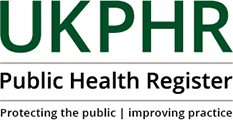Level 6 (degree) apprenticeship standard for public health practitioners: how does it link to practitioner registration?
By Claire Cotter, Workforce Development Programme Manager, Public Health England
David Kidney, Chief Executive, UK Public Health Register
Fiona Harris, Assistant Director of Public Health, Royal Borough Greenwich and Trailblazer Chair
You may have picked up on the background to the development of a degree apprenticeship for the occupation of Public Health Practitioner (PHP) in a previous BLOG. 
Following the approval of the Expression of Interest (EOI), in December 2017, we have now developed, consulted on, and submitted an apprenticeship standard for the PHP, to the Institute for Apprenticeships (IfA). We will know whether the standard has been accepted six weeks from now.
Once the standard is approved, we need to develop the End Point Assessment (EPA), which also has to be submitted and approved by the IfA; agree the funding that can be drawn from the apprenticeship levy to finance the off-the-job learning (the degree); and develop on-programme plans (which are advisory only), to inform the practical implementation of the apprenticeship by employers.
 An important aspect of the development of the degree apprenticeship is that the ‘job-ready’ practitioners completing the apprenticeship are occupationally competent. The UK benchmark demonstrating whether a practitioner is occupationally competent or not, is the professional registration standard with the UK Public Health Register. The practitioner standards have recently been reviewed and the amended version is out for consultation.
An important aspect of the development of the degree apprenticeship is that the ‘job-ready’ practitioners completing the apprenticeship are occupationally competent. The UK benchmark demonstrating whether a practitioner is occupationally competent or not, is the professional registration standard with the UK Public Health Register. The practitioner standards have recently been reviewed and the amended version is out for consultation.
It is envisaged that the EPA for the apprenticeship will ensure that the practitioner standard is reached and that competence will be demonstrated. This will mean that successful apprentices who complete the degree apprenticeship should be eligible to register as a public health practitioner (should they wish to) without having to complete a retrospective portfolio. This will be because they will have met key requirements for registration; for example, they will have had 36 months of on-the-job work experience, and they will have acquired knowledge across the breadth of public health practice at degree level (level 6). To help with the alignment, both the amended standards and the apprenticeship standard, have used the Public Health Skills and Knowledge Framework (PHSKF 2016) as a foundation.
The Trailblazer group has opted for an integrated degree, which means that the EPA is a part of it. This means that apprentices will not be able to complete a degree without completing the full requirement of the apprenticeship, including the assessment of occupational competence. All successful apprentices should therefore be able to register as a professional practitioner should they wish to.



Comments are closed.